
Writer: Sanjay Rughani. PHOTO/FILE/COURTESY
As we mark the 2024 International Day of the Girl, this year’s theme 'Girls’ Vision for the Future' presents both a powerful statement of hope and an urgent call to action because it reminds us of the untapped potential that lies within millions of young girls around the world.
Their dreams, ideas and voices carry the seeds of progress that can shape not just their own futures but that of entire communities. However, for the girl child’s vision to materialise, we must be deliberate in creating the environment and opportunities necessary for them to thrive.
The numbers tell a clear story. The 2024 Uganda Bureau of Statistics (UBOS) census revealed that despite progress in the education sector, nearly one in every four girls aged 6 to 18 years is out of school in Uganda.
While globally 129 million girls worldwide remain out of school, including 32 million of primary school age, according to a 2023 UNESCO report. In sub-Saharan Africa, girls are less likely to complete secondary education compared to boys, with only 66 percent of girls completing lower secondary school. This educational disparity is more than just a gap in knowledge, it’s a gap in opportunity, empowerment and economic growth.
The World Bank reports that for each additional year of education a girl receives, her potential future earnings can rise by 10-20 percent. This ripple effect influences her family and community, fostering greater economic prosperity and social stability.
At Standard Chartered, we have witnessed firsthand how the power of education and life skills can transform the future of young girls. Through our partnership with BRAC, we have been implementing the GOAL program since 2014, empowering over 480,000 adolescent girls with essential life skills and established safe spaces in 56 villages across 7 districts. As part of the programme, we have also established over 550 businesses for adolescent girls since 2014 and trained over 35,00 community leaders to continue championing the programme.
This program has been a cornerstone of our commitment to empowering girls and is more than just about education; it provides girls with knowledge on financial literacy, health and self-confidence, equipping them to navigate life's challenges and envision a brighter future.
Take the case of one of the beneficiaries, Resty Nankunda, a young woman from a rural community in Western Uganda. Resty was one of many girls at risk of dropping out of school due to financial constraints. Through her participation in the GOAL program, she gained life skills that not only helped her stay in school but also sparked her interest in entrepreneurship. Today, Resty runs a thriving agribusiness, employing several young women from her community and reinvesting her profits into local schools to support girls' education. Resty’s success demonstrates the transformative power of combining education with practical life skills.
When girls envision their future, they are not asking for the impossible. They seek the resources and the supportive systems that allow them to break through the barriers that have held back previous generations. As a financial institution, we believe that every girl should have the skills to navigate her financial journey, the confidence to pursue leadership, and the opportunities to innovate in every sector.
Research backs this up. A study by Plan International revealed that girls who complete secondary education are six times less likely to be married as children and 60 pecent more likely to survive childbirth. Additionally, McKinsey Global Institute estimates that advancing gender equality in education, workforce participation and leadership could add up to $12 trillion to global GDP by 2025. These numbers are compelling and reinforce the assertion that educating girls is not just a moral imperative—it’s an economic necessity.
Therefore, as we celebrate the International Day of the Girl, let us remember that these young voices are not just the future, they are the present. Their vision for the future is one that demands inclusivity, equality and action. It is our responsibility to listen, to act and to build the systems that allow every girl to turn her vision into reality.
The writer, Sanjay Rughani, is the Standard Chartered Bank Uganda Chief Executive Officer.







